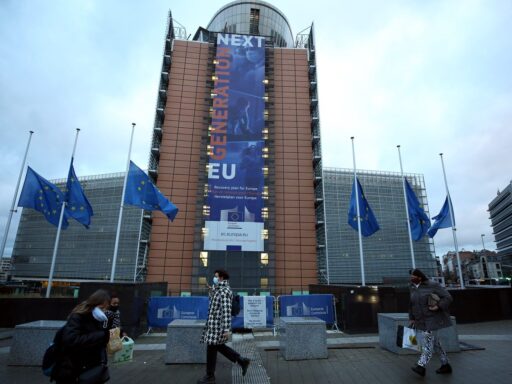This week, the EU got a powerful new tool — one that could give a boost to Biden.
The European Union has a new way to punish human rights abusers around the world.
This week, the EU signed off on a law that will give the bloc the power to ban travel and freeze assets of individuals and entities involved or associated with violating human rights, including genocide, slavery, extrajudicial arrests and killings, gender-based violence, human trafficking, and other abuses that are “widespread, systematic or are otherwise of serious concern.”
The EU’s adoption of this law is a big deal, both symbolically and practically. One of the European Union’s foundational principles is a commitment to human rights, democracy, and rule of law. But it has sometimes fallen short. This new tool will put some heft behind those commitments.
All 27 EU member states agreed — including some of the democratic-backsliding countries in the bloc like Hungary, which previously held up attempts to pass this kind of EU-wide law.
Practically, this gives the EU a lot more flexibility in whom and what it can target for rights violations. Previously, the EU was mostly limited to applying sanctions in country-specific situations, like a conflict, as in Syria, or for certain issues like terrorism or cyberattacks.
Since this law applies to all EU member states, it cuts violators off from a lot of travel — including nice vacation destinations on, say, the French Riviera — and from accessing and locating assets.
Juliet Sorensen, professor of law with Northwestern Pritzker School of Law’s Center for International Human Rights, told me this “is quite significant because it goes to financial flows, which, of course, the EU is in general a key part of.”
The EU’s new global sanctions regime borrows from the US’s Global Magnitsky Act, which gives the US the power to impose sanctions on any officials responsible for or connected to human rights violations or corruption around the world. Other countries, like the United Kingdom and Canada, have also passed versions of the law.
The EU’s sanctions regime has some flaws — for example, it doesn’t include corruption, and it requires all member states to agree on any sanctions, which may dilute its effectiveness as politics and national interests come into play.
But still, the bloc’s decision to officially join the club could be a powerful tool for the Western allies to coordinate action against human rights violators.
The Trump administration has often used its power under the Magnitsky Act to sanction human rights offenders, but now the US can better coordinate with its partners in the EU on any actions. That’s especially good news for the incoming Biden-Harris administration, which is eager to restore and build out America’s partnerships with Western allies.
“It shows that there is additional global firepower in the EU toolbox,” Julia Friedlander, senior fellow for transatlantic economic relations at the Atlantic Council, told me. “It’s important going into a new US administration, because the EU will be able to show we are global actors, that we’re taking on some of this additional responsibility.”
Why these Magnitsky-style laws matter
In 2012, President Barack Obama signed the Magnitsky Act, named for Russian attorney Sergei Magnitsky.
Magnitsky worked for Hermitage Capital, an investment fund founded by American-born financier Bill Browder, which was once was a major foreign investor in Russia. Magnitsky had reportedly uncovered a massive fraud and corruption scheme by the Russian government. He was jailed in Russia and died in custody in 2009; independent investigators found he was beaten and denied medical treatment.
In response, Browder lobbied US lawmakers, bringing attention to Magnitsky’s treatment and urging them to punish Russia and the officials involved.
Congress overwhelmingly passed the legislation, which targeted any Russian human rights violators, including those involved in Magnitsky’s detention and death. (Russia, of course, despised this, and retaliated by banning US citizens from adopting Russian children — which was the subject discussed at the infamous Trump Tower meeting in June 2016.)
In 2016, the US built on the legislation and took the Magnitsky Act global, giving America the power to sanction individuals and entities linked to human rights abuses or large-scale corruption worldwide.
The US has used global Magnitsky sanctions to punish Chinese officials responsible for the repression of the Uighurs in Xinjiang province, and to punish Saudi officials linked to the extrajudicial killing of Washington Post columnist Jamal Khashoggi. Just this Wednesday, the US imposed Magnitsky sanctions on three people and three entities, including a Kyrgyz official for corruption and money laundering and a Chinese man with ties to organized crime known as “Broken Tooth.”
Other countries have also adopted some version of the Magnitsky Act, including Canada, the United Kingdom, and Kosovo. The Australian government is soon likely to adopt a similar scheme, a move that adds another point of tension in the feud between Australia and China, as Beijing expects it will lead to more sanctions on those responsible for crackdowns in Hong Kong or Xinjiang.
And now, the 27 member states of the European Union have joined on. Though not officially named for Magnitsky — the Dutch apparently didn’t want any country to feel targeted — the law will accomplish much the same thing.
As Sorensen, the Northwestern law professor, put it, these laws will make it much harder for human rights abusers to profit off their positions of power, and to stash their money in places with reliable banking systems like the EU or US. “It is this idea of isolating these public officials, both financially and quite literally.”
Quite literally, because Europe will also now be off limits for travel under the legislation.
“No more trips to Cannes, Paris and Milan for human rights violators now that the EU has a Magnitsky Act in place,” Browder, the champion of these laws, wrote on Twitter. “Lots of dictators will be sitting nervously wondering if their days of enjoying European luxury are over.”
Author: Jen Kirby
Read More



